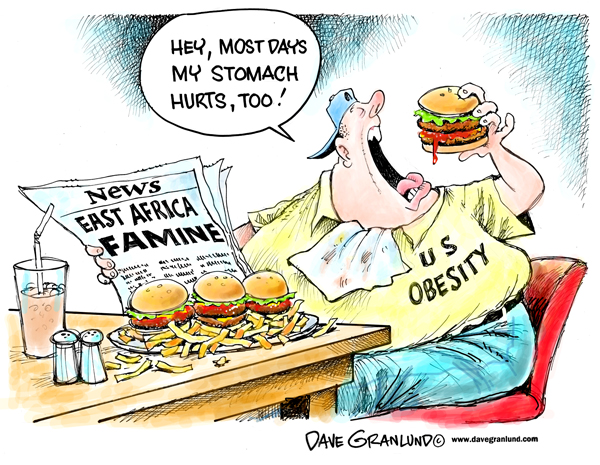Dear reader,
Let me ask you a series of questions. Think back to yesterday, or the day before, or however far back you can remember. What did you have for breakfast? Maybe you had eggs, waffles, toast, or a bowl of cereal. Maybe you're like me and you skipped breakfast all together and instead waited till lunch to get your fill. Do you remember what you had then? What about dinner? Was it a home cooked meal, did you go out to eat, or (if you're a poor college student like myself) did you settle for whatever choices the cafeteria decided to throw together?
Did you have choices for every meal?
Were you actually worried about where your next meal was going to come from, or have you been living each day in full confidence that you wouldn't miss a meal?
If you haven't, than you are the lucky 85.7 %
What does this mean you may ask?
This means, that in 2013,
14.3% of households in the US had no idea where or when their next meal would be. We call this:
Food Insecurity, and it's a very big and very real problem in this country.
Now, 14% doesn't seem like a lot so let's look at this number in a different (but true) light:
You are a 3rd grade teacher. In your class there are 25 bright and talented kids loaded with potential. 25 kids who you have worked closely with to encourage their growth and development. 25 kids who you treat like your own children. .
Now imagine 4 of these children struggling each and every day to pay attention. They want to, they really do, but something is occupying their minds to the point that anything you do is futile. As their teacher you are worried and decide to confront the parent(s) of one of these children.
You call the parent in to your office hoping to find a solution to the child's suffering. When you ask about problems at home the parent breaks down into a flood of tears. What you find out is that the child is starving. Their parents are starving. Each and everyday is a battle to put food on the table. In fact, the only sure meal the child gets is during school lunch time. And not even that is faithful. For one, school lunches are no good source of nutrition. Second, there is the problem of weekends and vacation weeks where the school is closed.
High costs of living plus low income makes
4 out of
25 kids who are silently suffering because their family can't afford to keep food on the table. And even when they can afford food, it's almost impossible to afford fresh food like fruits and vegetables.
What problem does this cause? Well, if families can't afford nutrition filled foods, they are forced to purchase inexpensive calorie filled food. In turn, more and more kids in the US are victim to obesity and many other diseases.
By now I'm sure you're wondering what exactly this has to do with environmental sociology? The answer:
externality.
An externality is a cost or benefit that someone goes through even though they didn't choose to.
You see, because of the business of agriculture and the rise in food prices, people can't afford to live healthy.
The families who suffer from food insecurity didn't choose to. They are an externality. They are only paying the prices that the growing industrialization of agriculture causes.
So while you're munching away (as I'm sure many of you are right now) on your processed bag of chips or cup of grapes, take a moment to appreciate it.
You have a choice that many people don't.
So now the question is: How can you help?
Well the first thing you have to do is talk about it! Talk about the problem of hunger. Make it known. It's not just a foreign problem that only happens in 3rd world countries. It's here to. Hunger is a universal problem so it needs to be talked about.
The next step depends on you.
Here is a link to the Feeding America site. An organization that fights hunger in America.
Here is a link to an international food charity!
Don't forget to check your local organizations for volunteer opportunities.
Be active, save lives, and fight hunger.
Sources:
Bell, Michael. An Invitation to Environmental Sociology. Thousand Oaks: Pine Forge, 1998. 34. Print.
Patel, R. (2008). Stuffed and starved: The hidden battle for the world food system. Brooklyn, N.Y: Melville House Pub.
http://www.ers.usda.gov/topics/food-nutrition-assistance/food-security-in-the-us.aspx











